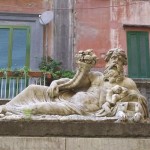
It is Italy, but not as we know it. Out of time and space, we’ve been some days in the city that was previously called “Nilsense” by its founders who came from Alexandria and settled here.
The story is of a credit card lost somewhere on the way to the centre of Naples, while strolling on a Sunday morning among the crowds. Theft in Naples – Nothing new about that, you think, it goes with familiar descriptions of the city; a reputation for more than its fair share of vagabonds, thieves and robbers. And it is true, the city is outlaw, anything can happen here, and it often does.
Mercurius – the quick loss, and with it the feeling of an equal loss of all reasons to have faith in the “good faith” of others. It was Sunday morning and we had been to the Chapel of San Severo. The world famous Chapel is known for its extraordinary baroque works carved in white marble, but it is not Enlightenment sculpture as we know it. The central body of Christ appears to continue to wrestle with death under a pure gossamer thin shroud.
The Christ sculpture is surrounded by other figures of a strange new wisdom. I stopped for a time before a lifesize figure of a naked man wrestling to emerge from – or is it to disappear under? – a thickly corded fishing net. A youthful naked angel holds the net’s edge, and I was unable to tell whether his purpose is it to pull back or to cover the naked man more completely. The creation is called Disignano -’disillusion’ (carved by Francesco Querilo, 1753-54) – and at the same time fills the viewer with curious illicit desires. It is no wonder the works of the Chapel’s creator Prince Raimondo di Sangro (1710-71) were called ‘a sink of all heresies’ by the 18th Century church, and he a sorcerer. I bought two postcards of this ambiguous work on the way out, but am unsure if I will ever send them, or to whom.
 It now feels close to, but not yet quite at the Axis Mundi, and after leaving the Chapel we made our way towards the Piazzetta Nilo (Nil Square), dawdling at several shops selling strange artefacts, and then stopping at the time-worn ancient monument, said to be more than 2000 years old and which the city’s founding colony erected as a homage to the River Nile.
It now feels close to, but not yet quite at the Axis Mundi, and after leaving the Chapel we made our way towards the Piazzetta Nilo (Nil Square), dawdling at several shops selling strange artefacts, and then stopping at the time-worn ancient monument, said to be more than 2000 years old and which the city’s founding colony erected as a homage to the River Nile.
We stop and stare up at the nearly naked bearded old man, wrinkled and ravaged by time, who is lying on a rock with a horn of plenty in his right hand. A broken sphinx supports his upper body, and his feet rest on the body of a crocodile, although both the heads of the sphinx and crocodile are now missing.
Having arrived at this “Nilsense” centre – afterwards the worst is the attempt to telephone the Bank and report the credit card lost or stolen. The conversation with the 24 Hour Call Centre seems to go on for ever and at the end finishes in disillusion, thwarted by the apparent parallel loss of our online identity to the Bank. There is no record of who we are, and so nothing can be done to cancel the card.
Disignano – our fear-filled imaginations are filled with pictures of a cornucopia of spending now taking place, a terrifying unstoppable wave spreading out from the crocodiled feet of the old man in Nil Square.
It is only one hour later, when we receive an email from our B&B owner. Have we lost a credit card, she asks. Somebody has found one near to a bus stop, and taped it to the outside window of a local B&B. It is a different residence to the one we are staying at, and its owner seems to have telephoned round other local places to ask if anyone with our name is staying. Later on the card is given to our B&B housekeeper who walks over to collect it, and it is returned to us at the end of another stunning weekend in Naples.
Piazzetta Nilo – showing us how happiness is lost and found in “Nilsense”. Meanwhile, back in the rest of Europe the same weekend I read that Mark Rutte, the Liberal Prime Minister of Holland has announced his new centre-right government’s intention to aboliish the welfare state. ‘The classical welfare state is slowly evolving into a “Participatory Society”, he states in the speech from the throne, ‘one, that is, where citizens will be expected to take care of themselves or create civil-society solutions for problems such as pensions, or welfare’.
The Dutch Socialist party leader Emile Roemer had the following reaction to this announcement, ‘This isn’t going to make anybody happier’, he says.